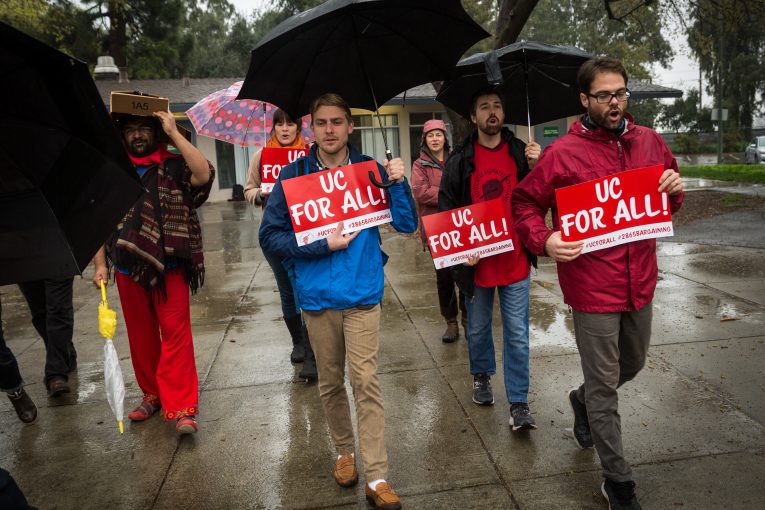

The Vanguard caught up with UC Student-Workers on Wednesday as they marched from Solano Park, where 11 residents were prepared to give testimony, only to have UC refuse to bargain at the location.
Across the system, student-workers from the nine campuses met with representatives from the UC Office of the President (UCOP) to continue collective bargaining for their new union contract. Among the other demands were demands for affordable housing, sanctuary campuses, an end to police brutality on UC campuses, expanded support for student-families, improved healthcare and childcare.
While the Vanguard was not allowed into the bargaining units, we were provided with texts from some of the speeches.
Ellie White, a 3rd year Civil and Environmental Engineering student, pointed out that “UC graduate academic student employees are paid $3,865 per year less than the living wage reported by Yolo County. This severely limits the options of affordable housing available to student… to the extent that some people are left without homes, with reports of students being homeless or living out of their cars.”
She said, “Our ability to pay for housing is a life or death issue… a fundamental need.
“The issue of affordable housing disproportionately affects minorities, first-generation students, those who do not have families or the financial support of families, immigrants who lack the social networks that gives one a safety net, and students who are already underrepresented or marginalized in academia. These are the people without homes. And when Solano Park closes in 2020 and no other affordable housing exists on campus, and no plans for affordable housing exists on campus these are the people UC Davis will be burdening,” she added.
Caroline McKusick, 7th year Anthropology PhD candidate, pointed out that, while the current city vacancy rate is 0.4 percent, “the student-family housing complex Orchard Park stood empty for three years, after the university forced out hundreds of families in 2014.”
She said that “the much-touted ‘sustainable’ housing complex in Davis, West Village, has a vacancy rate of 17%. Why is it, then, that in a city where there are people without houses as Ellie demonstrated, we have all these houses without people?”
Ms. McKusick pointed out that after UC Davis closed Orchard then announced they would close Solano Park. “Student Housing began dramatically raising rents and parking permit costs. What had once 
been affordable housing now came to cost almost 50% of a student-worker’s income.”
A university committee conducted research, she said, “concluded that monthly rent at the new Orchard Park should be only 33% of a TA [teaching assistant] salary, that the new complexes should maintain green spaces and play areas, and that ownership and management should remain in the hands of UC Davis, not private developers. They even gave some suggestions for fundraising to enable public ownership. You can see excerpts from that first committee’s report here.”
But the university ignored the recommendation and instead found that, according to then-Chancellor Linda Katehi, a “public-private partnership is the best model for Orchard Park.”
The university last year, in February 2017, announced that they would sign a contract with University Student Living to develop and operate the new Orchard Park. The rents were announced to be “as close to $1,000 as possible” – even though $1000 would be two-thirds of a TA’s salary.
Ms. McKusick stated, “This developer, University Student Living, is not just any housing developer. It is one of the eight developers the UC Regents hand-picked to be the only housing developers allowed to build student housing across the UC system. Not a single one of these developers specializes in affordable housing.”
Ms. McKusick argued that UC has increased rent for many years at both Solano and Orchard. “Where was that money going?” she asked. “Much of it went into Student Housing’s reserves–in fact, just from income from Solano and Orchard Park alone, Student Housing put away over $1,200,000 dollars in 2015. Although Student Housing budgets are opaque, we estimate that Student Housing has funneled anywhere from $35-40 million from Solano and Orchard Park rents into its reserves.”
Both the UC Regents and campus housing entities insist that there is no money for affordable housing.
Ms. McKusick believes, “UC unquestionably has the money and the means to support affordable housing.”
She argues that, instead “of handing those resources over to private developers as they are doing at West Village and elsewhere across the UC system, the UC could provide affordable housing instead. Solano and Orchard Park provide one model of such housing. We shouldn’t have to choose between quality and affordability in housing. We don’t deserve the scraps.”
—David M. Greenwald reporting


The link below says that the Yolo County living wage for a single person is $12.77/hr or $26,561/year. The minimum wage is $11.00/hr or $22,880/year $3,681 less so it sounds like UCD is paying grad students minimum wage.
These are all smart young adults and I’m always surprised when so many smart people never bother to ask what they will get paid for eight years as they work for an Anthropology PhD (or even ask what they will get paid after they get the PhD.)
http://livingwage.mit.edu/counties/06113
I think your comment misses the mark. When I got into Grad School, my view was pick the right place and figure out how to make it work later.
This is an important story no one is commenting on – even “affordable” housing on campus is not “affordable enough.”
Grad students deserve to have actual housing. Its not unreasonable to demand the University provide it. They have the space and the money. Just get it done already.
What is a grad student’s total comp? ‘Salary’, health benefits, discounts/waivers on tuition, etc.? Meant as honest question…
Ken A… don’t think grad students “work” anywhere near 2080 hours a year… not credible…